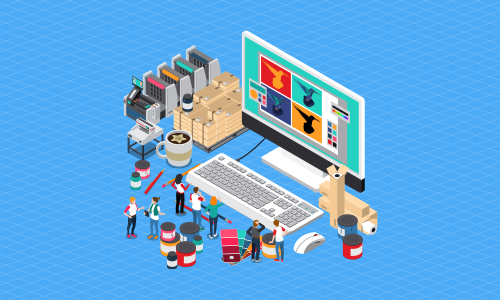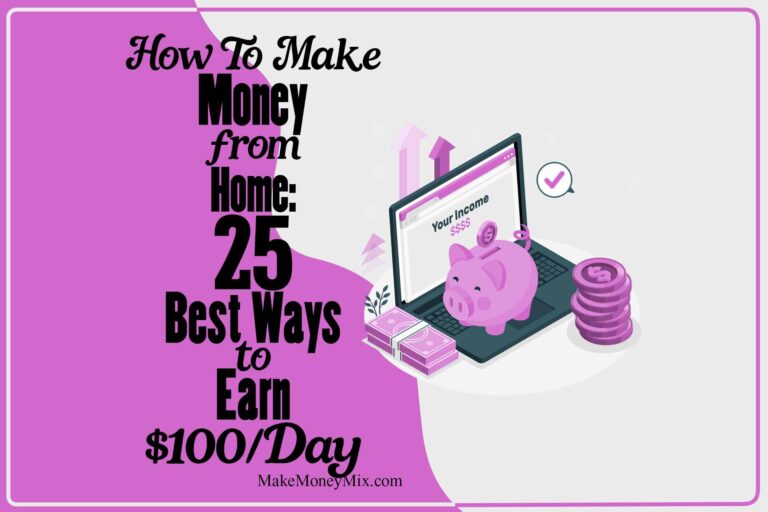27 Effective Ways to Make Money Online ($9,833+ Per Month)

The internet is no longer just a place for entertainment or communication. Now, it’s a goldmine for anyone looking to make money.
Whether you’re looking to escape the 9-to-5 job, earn extra cash on the side, or build a full-time online business, the opportunities are limitless.
2025 has brought about even more ways to tap into this vast world of online income, and the best part?
You don’t need to be a tech expert or have a large budget to get started.
With the right strategy and mindset, anyone can turn their skills, hobbies, or passions into a lucrative online venture.
Top 27 Effective Ways To Make $9,833+ Monthly Online
In this guide, I’ll walk you through the top effective ways to make $9,833+ online in 2025.
From simple side hustles to scalable business models, each method is beginner-friendly and actionable so that you can start today.
Ready to start earning?
Let’s dive in!
Earning Disclaimer: The information provided in this post is for educational purposes only and does not guarantee any specific earnings or financial results.
Earnings depend on various factors, including your skills, effort, and market conditions.
1. Sell Print-on-Demand Products
Print-on-demand (POD) is a business model that allows you to sell custom-designed products without holding inventory.
When a customer orders, the product is printed and shipped directly to them.
How it Works: You partner with a POD provider who handles production and fulfillment.
After setting up your online store and uploading your designs, the provider prints and ships products on demand when orders are placed.
Earning Potential: Your earnings depend on product pricing and sales volume. Profit margins typically range from 20% to 50%.
The average monthly income for a print-on-demand business is around $4,639, ranging from $1,583 to $9,833.
Skills Required: Basic graphic design skills, understanding of e-commerce platforms, and digital marketing knowledge.
Requirements to Start:
- E-commerce Platform: Set up a store on platforms like Shopify or Etsy.
- Design Tools: Use tools like Canva or Adobe Illustrator to create designs.
- POD Provider: Partner with services like Printify or Printful for product fulfillment.
Startup Costs: Initial investments include setting up your online store, purchasing design tools, and marketing expenses.
However, there’s no need to invest in inventory, reducing upfront costs.
How to Start:
- Choose Niche: Identify a target market you’re passionate about.
- Select Products: Decide on customized items, such as t-shirts or mugs.
- Create Designs: Develop unique graphics that resonate with your audience.
- Set Up Your Store: Integrate your store with a POD provider.
- Market Your Products: Utilize social media and SEO strategies to attract customers.
How You Can Earn:
- Product Sales: Generate income through each sale made.
- Upselling: Offer related products to increase average order value.
- Email Marketing: Build a mailing list to promote new designs and special offers.
Tips for Success:
- Research Your Market: Understand your target audience’s preferences.
- Quality Designs: Invest time in creating appealing and original designs.
- Optimize Product Listings: Use high-quality images and detailed descriptions.
- Promote Actively: Engage with potential customers through social media and email campaigns.
- Monitor Performance: Use analytics to track sales and adjust strategies accordingly.
2. Monetize a Blog
Blogging offers a platform to share your passions and expertise while generating income.
By creating valuable content, you can attract readers and monetize your blog through various methods.
How it Works: You create engaging content on topics you’re passionate about.
As your audience grows, you can monetize through advertisements, sponsored posts, affiliate marketing, and selling digital products or services.
Earning Potential: Income varies based on traffic and monetization methods.
On average, a beginner blogger can often earn below $500 monthly.
An experienced blogger can earn between $5,000 and $50,000 monthly by leveraging various income streams like sponsored posts, digital products, or consulting.
Skill Required: Strong writing skills, SEO knowledge, and basic marketing understanding.
Requirements to Start:
- Blog Platform: Choose a blogging platform like WordPress or Medium.
- Domain Name and Hosting: Secure a domain name and reliable hosting service.
- Content Strategy: Develop a plan for regular, high-quality posts.
Startup Costs: Minimal. Expenses include domain registration, hosting, and possibly premium themes or plugins.
How to Start:
- Select a Niche: Focus on topics you’re knowledgeable about and that interest the audience.
- Set Up Your Blog: Register your domain, choose hosting, and design your site.
- Create Quality Content: Write informative and engaging posts consistently.
- Promote Your Blog: Use social media, SEO, and networking to increase visibility.
- Monetize: Implement strategies like ads, affiliate links, sponsored content, or selling products.
Tips for Success:
- Consistency: Post regularly to keep readers engaged.
- Engagement: Interact with your audience through comments and feedback.
- Diversify Income Streams: Combine multiple monetization methods for stability.
3. Sell Digital Products
Digital products are intangible goods like eBooks, online courses, software, or digital art that can be sold online.
They offer high-profit margins due to low production and distribution costs.
How it Works: You create digital products and sell them through your website or platforms like Gumroad or Etsy.
Customers purchase and download the products directly.
Earning Potential: Earnings depend on product pricing and sales volume. Some creators earn a passive income, while others generate substantial revenue.
Revenue Projections
- Low-end: If you’re selling digital products like e-books or printables and have a niche audience, you could start earning $500 to $2,000 per month with some effort in marketing and building an audience.
- Mid-range: With online courses or membership sites, you can scale to $5,000 to $20,000 per month, especially with a growing audience.
- High-end: Successful SaaS businesses, high-ticket courses, or premium services can earn $50,000+ per month or more, especially with a well-executed business model and ongoing marketing campaigns.
Skill Required: Product development skills, marketing, and basic e-commerce knowledge.
Requirements to Start:
- Product Idea: Identify a digital product that solves a problem or fulfills a need.
- Creation Tools: Use appropriate software for product development (e.g., eBook authors use writing tools; course creators use video editing software).
- Sales Platform: Decide where to sell your products (your website, Gumroad, Etsy, etc.).
Startup Costs: Generally low. Costs may include software subscriptions, marketing, and platform fees.
How to Start:
- Develop Your Product: Create a high-quality digital product that offers value.
- Set Up a Sales Platform: Choose where to sell (your site, Gumroad, Etsy, etc.).
- Market Your Product: Use social media, email marketing, and SEO to reach your target audience.
- Optimize Sales Funnel: Ensure a smooth purchasing process and consider offering upselling or discounts.
Tips for Success:
- Quality Content: Ensure your digital products are well-designed and provide value.
- Target Audience: Understand your audience’s needs to tailor your products effectively.
- Continuous Improvement: Gather feedback and update your products regularly.
4. Become a Reseller
Reselling involves purchasing products at a lower price and selling them at a profit. This model allows you to leverage market demand without creating products.
How it Works: You source products from wholesalers, manufacturers, or clearance sales, then list them on platforms like eBay, Amazon, or your own e-commerce site.
When a customer purchases, you ship the product, earning the difference between your purchase and sale price.
Earning Potential: Earnings vary based on product selection, pricing strategy, and sales volume.
Some resellers earn modest side income, while others build substantial businesses.
For example, one reseller reported making up to $5,000 a month with minimal effort.
Skills Required: Market research, negotiation, product sourcing, and online sales expertise.
Requirements to Start:
- Product Sourcing: Identify reliable suppliers offering quality products at competitive prices.
- Sales Channels: Choose platforms that align with your target market, such as eBay, Amazon, or niche marketplaces.
- Business Setup: Register your business and obtain any necessary permits.
Startup Costs: Initial investments include inventory purchases, platform fees, and marketing expenses.
Starting small can minimize risks, allowing you to scale as you gain experience.
How to Start:
- Research the Market: Identify products with demand and reasonable competition.
- Find Suppliers: Connect with wholesalers or manufacturers offering favorable terms.
- Set Up Sales Channels: Create seller accounts on chosen platforms, optimizing listings for visibility.
- Manage Operations: Handle inventory, process orders promptly, and provide excellent customer service.
Tips for Success:
- Start Small: Test the market with a limited inventory to gauge demand.
- Focus on Niche Markets: Specializing can reduce competition and attract dedicated customers.
- Stay Informed: Keep abreast of market trends and adjust your inventory accordingly.
- Optimize Listings: Use high-quality images and detailed descriptions to enhance appeal.
- Manage Finances: Keep accurate records of expenses and revenues for profitability analysis.
5. Try Affiliate Marketing
Affiliate marketing entails promoting products or services of other companies and earning a commission for each sale made through your referral.
It’s a performance-based model ideal for individuals with a strong online presence.
How it Works: You partner with companies offering affiliate programs, receive unique tracking links, and promote their products via your website, blog, or social media.
When someone purchases through your link, you earn a commission.
Earning Potential: Commissions vary by program, ranging from a few cents to substantial amounts for high-ticket items.
Some affiliates earn significant incomes, with reports of individuals making up to $50,000 through strategic marketing.
Skills Required: Content creation, digital marketing, SEO, and audience engagement.
Requirements to Start:
- Platform: A blog, website, or active social media profile with a substantial following.
- Affiliate Programs: Sign up for programs that align with your niche and audience interests.
- Content Strategy: Develop content that naturally incorporates affiliate products, providing value to your audience.
Startup Costs: Generally low. Expenses may include website hosting, marketing tools, and promotional activities.
How to Start:
- Choose a Niche: Focus on areas you’re knowledgeable about and that have profitable affiliate programs.
- Build Your Platform: Create a website or grow your social media presence to attract your target audience.
- Join Affiliate Programs: Apply to programs offering products relevant to your niche.
- Create Engaging Content: Develop reviews, tutorials, or informative posts that incorporate affiliate products naturally.
- Promote Strategically: Utilize SEO, email marketing, and social media to drive traffic to your content.
Tips for Success:
- Authenticity: Promote products you genuinely believe in to maintain trust with your audience.
- Diversify Income Streams: Engage in multiple affiliate programs to mitigate risks.
- Engage with Your Audience: Respond to feedback and tailor your content to their needs.
- Stay Updated: Keep abreast of industry trends and adjust your strategies accordingly.
- Comply with Regulations: Disclose affiliate relationships transparently to maintain credibility.
6. Become an Influencer
Influencers are individuals who have built a substantial following on social media platforms by sharing engaging content.
Brands collaborate with influencers to promote products or services to their audience.
How it Works: By consistently posting content that resonates with your target audience, you grow your follower base.
Once you have a significant and engaged following, brands may approach you for partnerships, offering compensation in exchange for promoting their products or services.
Earning Potential: Earnings vary widely based on follower count, engagement rates, and niche.
Micro-influencers (10K-50K followers) can earn anywhere from $500 to $5,000 per post, while mid-tier influencers (50K-200K followers) might earn $5,000 to $20,000 per post.
Top-tier influencers (200K+ followers) can make $20,000 to $500,000 or more per post, especially with brand partnerships, sponsored content, affiliate marketing, and product collaborations.
Skill Required: Content creation, photography/videography, storytelling, and understanding of social media algorithms.
Requirements to Start:
- Social Media Presence: Active profiles on platforms like Instagram, TikTok, YouTube, or Twitter.
- Content Creation Tools: Smartphone or camera for high-quality photos and videos.
- Engagement Strategy: Regular interaction with your audience through comments, polls, and messages.
Startup Costs: Minimal. Investments may include equipment for content creation and possibly paid promotions to increase visibility.
How to Start:
- Choose Your Niche: Focus on topics you’re passionate about, such as fashion, fitness, technology, or travel.
- Create High-Quality Content: Share visually appealing and authentic posts that resonate with your target audience.
- Engage Consistently: Post regularly and interact with your followers to build a loyal community.
- Collaborate with Brands: Once you have a substantial following, reach out to brands or join influencer marketing platforms to find partnership opportunities.
Tips for Success:
- Authenticity: Be genuine in your interactions and only promote products you truly believe in.
- Consistency: Maintain a regular posting schedule to keep your audience engaged.
- Networking: Connect with other influencers and brands to expand your reach and opportunities.
7. Offer Transcription Services
Transcription involves converting audio or video recordings into written text. It’s essential in fields like legal, medical, and media.
How it Works: Clients provide audio or video files, and you transcribe them into text documents.
Accuracy and attention to detail are crucial, especially in specialized fields.
Earning Potential: Rates vary based on complexity and turnaround time.
General transcriptionists might earn $10–$20 per hour of audio, while specialized transcriptionists (e.g., medical or legal) can earn $25–$50 or more.
Skills Required: Fast and accurate typing, excellent listening skills, proficiency in grammar and punctuation, and familiarity with transcription software.
Requirements to Start:
- Computer: Reliable device with internet access.
- Headphones: High-quality headphones for clear audio.
- Transcription Software: Tools to play audio and assist in transcribing.
- Quiet Workspace: A distraction-free environment to ensure accuracy.
Startup Costs: Low. Initial investments may include transcription software and marketing your services.
How to Start:
- Develop Your Skills: Practice transcribing various audio types to improve speed and accuracy.
- Set Up Your Workspace: Ensure you have the necessary equipment and a quiet environment.
- Market Your Services: Create a professional website or profile on freelance platforms showcasing your skills and experience.
- Network: Connect with potential clients, such as podcasters, businesses, and agencies, to offer your services.
Tips for Success:
- Specialize: Consider focusing on niches like medical or legal transcription for higher rates.
- Accuracy: Double-check your work to minimize errors.
- Time Management: Develop efficient workflows to handle multiple projects.
8. Sell Stock Photography
Stock photography involves capturing high-quality images that can be licensed for various uses, such as advertising, publishing, and digital content creation.
Photographers earn royalties whenever their images are downloaded or purchased.
How it Works: You create diverse and high-quality photographs that cater to common themes and needs in the market.
These images are uploaded to stock photography platforms, where buyers browse and purchase licenses to use them. Each download generates income for you.
Earning Potential: Earnings vary based on factors like image quality, relevance, and demand.
- Per Image Sale: Stock photo platforms like Shutterstock, Adobe Stock, and iStock typically pay between $0.25 to $5 per download. The more downloads you get, the higher your total earnings.
- Revenue per Month: A photographer with a solid portfolio of 500+ high-quality images can earn anywhere from $100 to $1,000+ per month, depending on the niche, image quality, and demand.
- Exclusive Licensing: If you sell exclusive rights to certain images (directly or via platforms like Getty), you can earn higher rates, sometimes $50 to $500 per image.
Skills Required: Proficiency in photography, understanding of composition and lighting, and knowledge of market trends.
Requirements to Start:
- Camera Equipment: A high-resolution camera capable of producing professional-quality images.
- Editing Software: Tools like Adobe Photoshop or Lightroom for post-processing.
- Stock Photography Accounts: Registrations on platforms like Shutterstock, Adobe Stock, or Getty Images.
Startup Costs: Moderate. Initial investments include purchasing quality camera equipment and editing software.
How to Start:
- Develop Photography Skills: Learn about composition, lighting, and editing to produce marketable images.
- Create Diverse Content: Capture a wide range of subjects and themes to appeal to various buyers.
- Select Platforms: Choose reputable stock photography sites that align with your target audience.
- Upload and Optimize: To enhance discoverability, submit your images with relevant keywords and descriptions.
- Promote Your Portfolio: Share your work on social media and photography forums to increase visibility.
Tips for Success:
- Understand Market Demand: Research trending topics and popular themes to guide your photography.
- Maintain High Quality: Ensure all images are sharp, well-lit, and professionally edited.
- Be Consistent: Regularly upload new content to keep your portfolio fresh and engaging.
- Engage with the Community: Participate in photography groups and forums to learn and network.
9. Sell Handmade Products
Selling handmade products involves creating and selling items you’ve crafted yourself, such as jewelry, art, or home decor.
This approach allows you to monetize your creativity and craftsmanship.
How it Works: You design and produce handmade items, then sell them through online platforms, local markets, or your own website.
Platforms like Etsy and Amazon Handmade connect artisans with customers seeking unique, handcrafted goods.
Earning Potential: Earnings depend on product pricing, demand, and sales volume. Some sellers earn modest supplementary income, while others build full-time businesses.
On platforms like Etsy, handmade products can range from $5 to $500+ per item.
For example, a seller with a unique, high-quality product line and good marketing could earn anywhere from $500 to $5,000+ per month.
Skill Required: Craftsmanship in your chosen medium, business acumen, and marketing skills.
Requirements to Start:
- Crafting Supplies: Materials needed to create your products.
- Workspace: A dedicated area for crafting and storing inventory.
- Selling Platforms: Accounts on sites like Etsy, Amazon Handmade, or your own e-commerce site.
Startup Costs: Variable. Costs include materials, tools, platform fees, and marketing expenses.
How to Start:
- Develop Your Craft: Hone your skills to create high-quality, desirable products.
- Set Up Sales Channels: Decide where to sell—online platforms, local markets, or both.
- Price Your Products: Calculate costs and desired profit margins to set competitive prices.
- Market Your Work: Use social media, email marketing, and SEO to reach potential customers.
- Manage Operations: Handle inventory, process orders promptly, and provide excellent customer service.
Tips for Success:
- Identify Your Niche: Focus on products that reflect your passion and have market demand.
- Quality Photography: Use clear, high-quality images to showcase your products effectively.
- Engage with Customers: Respond to inquiries and feedback to build a loyal customer base.
- Stay Organized: Keep track of inventory, orders, and finances to streamline operations.
10. Start a Podcast
Podcasting allows you to share your ideas, stories, and expertise with a global audience through audio content.
With dedication and strategic planning, you can monetize your podcast and turn it into a profitable venture.
How it Works: You create audio episodes on topics you’re passionate about and distribute them through podcast directories like Apple Podcasts or Spotify.
As your audience grows, you can monetize through sponsorships, advertisements, merchandise sales, or premium content subscriptions.
Earning Potential: Income varies based on audience size, engagement, and methods of monetization.
Smaller podcasts (1,000–5,000 downloads per episode) can earn $100 to $1,000+ per month through sponsorships, ads, and listener support (e.g., Patreon).
Larger podcasts with 50,000+ downloads per episode can generate $5,000 to $50,000+ per month through sponsorships, merchandise sales, and premium content.
Skill Required: Content creation, audio editing, marketing, and audience engagement.
Requirements to Start:
- Concept Development: Define your podcast’s niche and target audience.
- Equipment: Invest in a quality microphone, headphones, and audio editing software.
- Hosting Platform: Choose a reliable podcast hosting service to distribute your episodes.
- Promotion Strategy: Utilize social media, collaborations, and SEO to grow your listener base.
Startup Costs: Moderate. Expenses include equipment, hosting fees, and marketing efforts.
How to Start:
- Identify Your Niche: Choose a subject you know and have an audience interest.
- Plan Your Content: Outline episode formats, topics, and release schedules.
- Set Up Recording Equipment: Ensure clear audio quality with proper equipment.
- Record and Edit Episodes: Produce engaging content with professional editing.
- Launch and Promote: Release initial episodes and market them to attract listeners.
Tips for Success:
- Consistency: Maintain a regular publishing schedule to build a loyal audience.
- Engagement: Interact with listeners through feedback, Q&A sessions, and community building.
- Monetization Planning: Introduce revenue streams once you have a steady listener base.
11. Become a Virtual Assistant
Virtual assistants (VAs) provide remote administrative, technical, or creative support to clients.
This role offers flexibility and the opportunity to work with diverse businesses.
How it Works: As a VA, you offer services such as email management, scheduling, data entry, social media management, or customer support.
Clients hire you to handle specific tasks, allowing them to focus on core business activities.
Earning Potential: Rates vary based on services offered and experience.
- Entry-Level: Starting VAs typically charge $10 to $25 per hour, earning around $1,000 to $2,500 per month for part-time work.
- Experienced VAs: With more specialized skills (e.g., social media management, customer service, email marketing), VAs can charge $25 to $75 per hour, earning between $3,000 to $7,500 per month.
- Specialized VAs: Those with niche skills (like bookkeeping, project management, or web design) can charge $50 to $100+ per hour, earning $5,000 to $15,000+ per month.
- Full-Time: As a full-time VA, you can earn anywhere from $2,500 to $10,000+ per month based on your rates and workload.
New VAs might charge $20–$30 per hour, while experienced professionals can command higher rates.
Skill Required: Organizational skills, communication, proficiency with office software, and self-motivation.
Requirements to Start:
- Skill Assessment: Identify services you can offer based on your strengths and experience.
- Online Presence: Create a professional website or profile on platforms like LinkedIn.
- Networking: Connect with potential clients through social media, job boards, and VA networks.
Startup Costs: Low. Investments may include setting up a website, marketing, and any necessary training.
How to Start:
- Define Your Services: Decide which tasks you excel at and enjoy doing.
- Set Your Rates: Research industry standards and determine competitive pricing.
- Build Your Brand: Develop a professional online presence showcasing your skills and testimonials.
- Find Clients: Utilize job boards, social media, and direct outreach to secure contracts.
- Deliver Quality Service: Provide exceptional support to build long-term client relationships.
Tips for Success:
- Specialize: Focusing on niche services can differentiate you in the market.
- Continuous Learning: Stay up-to-date with tools and trends to enhance your offerings.
- Client Communication: Maintain clear and professional interactions to ensure satisfaction.
12. Participate in Online Surveys
Online surveys involve sharing your opinions on products, services, or general topics in exchange for compensation.
Companies value consumer feedback to improve their offerings, making this a straightforward way to earn money online.
How it Works: You sign up with survey platforms that match you with relevant surveys. After completing a survey, you receive payment, which can be in cash, gift cards, or other rewards.
Earning Potential: Participating in online surveys can offer a modest income, typically ranging from $1 to $5 per survey, depending on the survey length and platform.
Serious participants can earn around $50 to $200 per month if they consistently complete surveys.
Skill Required: No specific skills are needed, but attentiveness and honesty are essential to provide valuable feedback.
Requirements to Start:
- Internet Access: A reliable connection to participate in online surveys.
- Email Address: To receive survey invitations and notifications.
- Time Commitment: Allocate time to complete surveys, ranging from a few minutes to over an hour.
Startup Costs: None. Most survey platforms are free to join.
How to Start:
- Research Platforms: Look for reputable survey sites with positive reviews and reliable payment histories.
- Sign Up: Register and complete your profile to receive surveys that match your demographics.
- Participate Regularly: Consistently engage with surveys to maximize earnings.
- Redeem Rewards: Accumulate and redeem points or earnings according to the platform’s options.
Tips for Success:
- Diversify Platforms: Join multiple survey sites to increase the number of available surveys.
- Stay Organized: Keep track of your earnings and the time invested to assess profitability.
- Be Honest: Provide genuine feedback to ensure the quality of your responses and maintain eligibility for future surveys.
13. Start a YouTube Channel
YouTube allows you to create and share video content on topics you’re passionate about.
With engaging videos, you can attract viewers and monetize your channel through ads, sponsorships, and merchandise sales.
How it Works: You produce videos on subjects that interest you and resonate with your target audience.
As your channel grows, you can enable monetization features like ads, collaborate with brands for sponsored content, and sell your own products or services.
Earning Potential: Income varies widely based on viewership, engagement, and monetization methods.
With 1,000 to 10,000 subscribers, you can earn $50 to $500/month through ads, sponsorships, and affiliate marketing.
Channels with 100,000+ subscribers can earn $5,000 to $50,000+/month or more, depending on the content, audience engagement, and monetization methods like ads, sponsorships, merchandise, and memberships.
Skills Required: Video production, editing, content creation, and marketing.
Requirements to Start:
- Recording Equipment: A good quality camera and microphone.
- Editing Software: Tools to edit and enhance your videos.
- Consistency: Regular content uploads to build and retain an audience.
Startup Costs: Moderate. Investments include equipment, software, and possibly marketing.
How to Start:
- Identify Your Niche: Choose topics you’re knowledgeable about and that have a potential audience.
- Create High-Quality Content: Focus on delivering value through informative, entertaining, or inspiring videos.
- Optimize for Search: Use relevant keywords, tags, and descriptions to make your videos discoverable.
- Engage with Your Audience: Respond to comments and feedback to build a community.
- Monetize: Once eligible, apply for the YouTube Partner Program, seek sponsorships, and consider merchandise options.
Tips for Success:
- Be Authentic: Let your personality and passion shine through your content.
- Invest in Learning: Continuously improve your filming and editing skills.
- Promote Your Channel: Share your videos on social media and collaborate with other creators to expand your reach.
14. Livestream on Platforms like Twitch
Livestreaming involves broadcasting live video content to an online audience in real time.
Platforms like Twitch specializes in live content, notably gaming, and various other categories.
How it Works: You stream live videos on platforms like Twitch, engaging with viewers in real time through chat.
Monetization comes from viewer subscriptions, donations, sponsorships, and ad revenues. Consistency and interaction are key to building a loyal audience.
Earning Potential: Varies based on audience size and engagement.
New streamers can earn $50 to $500/month through ads, donations, and affiliate links.
Established streamers with 50,000+ followers can earn $1,000 to $10,000+/month or more, especially with Twitch subscriptions ($4.99/month) and sponsorship deals.
Skills Required: Engaging personality, technical proficiency with streaming equipment, and content creation skills.
Requirements to Start:
- Streaming Equipment: A good computer, webcam, microphone, and reliable internet connection.
- Streaming Software: Tools like OBS Studio to manage your stream.
- Platform Account: A registered account on a streaming platform like Twitch.
Startup Costs: Moderate. Investments include equipment and possibly software.
How to Start:
- Set Up Your Equipment: Ensure you have the necessary hardware and software for streaming.
- Choose Your Platform: Decide where you want to stream based on your target audience.
- Plan Your Content: Decide on the type of content you’ll stream, such as gaming, tutorials, or Q&A sessions.
- Engage with Viewers: Interact through live chat to build a community.
- Monetize: Utilize platform monetization features like subscriptions and ads and seek sponsorships.
Tips for Success:
- Consistency: Stream regularly to build and maintain an audience.
- Engagement: Interact with viewers to foster a community.
- Quality Content: Ensure your streams are entertaining, informative, or both.
15. Become a Social Media Consultant
As a social media consultant, you assist businesses in enhancing their online presence by developing and executing effective social media strategies.
How it Works: You analyze a company’s current social media activities, identify areas for improvement, and create tailored strategies to boost engagement and reach.
Services may include content creation, account management, and performance analysis.
Earning Potential: Consultants can charge hourly rates ranging from $50 to $200, depending on experience and the services’ complexity.
Skill Required: In-depth knowledge of social media platforms, marketing strategies, analytics, and excellent communication skills.
Requirements to Start:
- Portfolio: Demonstrated experience with successful social media campaigns.
- Networking: Building relationships with potential clients through platforms like LinkedIn.
- Continuous Learning: Staying up-to-date with the latest social media trends and tools.
Startup Costs: Minimal. Investments may include marketing your services and acquiring necessary analytics and content creation tools.
How to Start:
- Develop Expertise: Gain experience by managing social media accounts, either personally or for small businesses.
- Create a Portfolio: Showcase successful campaigns and measurable results.
- Market Your Services: Utilize your own social media channels and professional networks to reach potential clients.
- Offer Free Initial Consultations: Attract clients by demonstrating your value before formalizing contracts.
Tips for Success:
- Understand Client Goals: Align social media strategies with each client’s business objectives.
- Measure and Report: Provide clients with regular performance reports to demonstrate value.
- Adaptability: Be prepared to adjust strategies based on analytics and changing trends.
16. Become a Freelance Writer
Freelance writing involves creating content for various clients, including articles, blog posts, marketing materials, and more.
This career offers flexibility and the opportunity to work on diverse projects.
How it Works: As a freelance writer, you collaborate with clients to produce written material tailored to their needs.
Projects can range from short blog posts to comprehensive e-books. Writers typically set their own rates and work schedules, managing multiple clients simultaneously.
Earning Potential: Earnings vary based on experience, niche, and workload.
You can earn $20 to $100+ per hour as a freelance writer, depending on your expertise, niche, and experience.
Beginners may earn $500 to $2,000/month, while experienced writers can earn $3,000 to $10,000+/month or more. Specialized niches (e.g., tech, finance) tend to pay higher rates.
Skill Required: Strong writing abilities, research skills, adaptability to different writing styles, and time management.
Requirements to Start:
- Writing Samples: Develop a portfolio showcasing your writing skills.
- Networking: Connect with potential clients through platforms like LinkedIn and freelance job boards.
- Continuous Learning: Stay updated with industry trends and improve your craft.
Startup Costs: Minimal. A computer, internet connection, and word-processing software are essential.
How to Start:
- Identify Your Niche: Focus on areas you’re knowledgeable about or interested in.
- Build a Portfolio: Create samples that highlight your versatility and expertise.
- Set Your Rates: Research industry standards to determine competitive pricing.
- Find Clients: Utilize freelance platforms, job boards, and direct outreach to secure projects.
- Deliver Quality Work: Ensure timely and high-quality submissions to build a positive reputation.
Tips for Success:
- Specialize: Consider focusing on a niche to attract clients seeking specific expertise.
- Network Actively: Attend industry events and engage in online communities to expand your client base.
- Manage Finances: Keep track of income and expenses for tax purposes and financial planning.
17. Become a Freelance Editor
Freelance editors review and refine written content, ensuring clarity, coherence, and correctness.
They work on various materials, including manuscripts, articles, and marketing copy.
How it Works: As a freelance editor, you collaborate with authors, businesses, or publishers to enhance their content.
Tasks may involve correcting grammatical errors, improving sentence structure, and ensuring consistency.
Earning Potential: Rates depend on experience, project complexity, and client budgets. Entry-level editors might charge $25–$50 per hour, while experienced editors can command higher fees.
Skills Required: Exceptional grammar and language skills, attention to detail, familiarity with style guides, and the ability to work under deadlines.
Requirements to Start:
- Editing Samples: Develop a portfolio demonstrating your editing proficiency.
- Professional Development: Engage in continuous learning to stay abreast of editing standards and tools.
- Networking: Connect with writers, publishers, and organizations that may require editing services.
Startup Costs: Low. A computer, internet access, and editing software are the primary tools needed.
How to Start:
- Assess Your Skills: Identify areas of strength and opportunities for improvement in editing.
- Build a Portfolio: Offer to edit content for friends, local businesses, or non-profits to gain experience.
- Set Your Rates: Determine pricing based on industry standards and your experience level.
- Seek Clients: Use freelance platforms, attend writing workshops, and join professional networks to find opportunities.
- Deliver Excellence: Provide meticulous editing services to establish a strong reputation and secure repeat business.
Tips for Success:
- Identify Your Niche: Decide whether to specialize in areas like developmental editing, copyediting, or proofreading.
- Continuous Improvement: Regularly update your skills and knowledge of editing tools and techniques.
- Client Relationships: Communicate effectively with clients to understand their vision and expectations.
18. Become a Freelance Photographer
Freelance photography lets you capture images for various clients, including individuals, businesses, and media outlets.
This career offers creative freedom and the potential for a diverse income stream.
How it Works: As a freelance photographer, you manage all aspects of your business, from marketing your services to editing photos.
Clients may hire you for events, portraits, product photography, or editorial work.
Earning Potential: Income varies based on experience, specialization, and workload.
Entry-level photographers might earn around $25–$50 per hour, while seasoned professionals can command higher rates.
Skills Required: Proficiency with camera equipment, understanding of lighting techniques, photo editing skills, and business acumen.
Requirements to Start:
- Equipment: Invest in a quality camera, lenses, lighting, and editing software.
- Portfolio: Develop a portfolio showcasing your best work to attract potential clients.
- Networking: Connect with potential clients through social media, local events, and collaborations.
Startup Costs: Moderate. Initial investments include purchasing equipment and marketing your services.
How to Start:
- Enhance Your Skills: Take photography courses and practice regularly to improve your craft.
- Build a Portfolio: Offer free sessions initially to build a diverse portfolio.
- Set Your Rates: Research industry standards and determine competitive pricing.
- Market Your Services: Utilize social media platforms, create a professional website, and network within your community.
- Manage Your Business: Handle contracts, invoicing, and client communications professionally.
Tips for Success:
- Define Your Niche: Specialize in areas like weddings, portraits, or commercial photography to stand out.
- Continuous Learning: Stay updated with the latest photography trends and technologies.
- Client Relationships: Provide exceptional service to encourage repeat business and referrals.
19. Become a Freelance Videographer
Freelance videography involves capturing and editing video content for clients across various industries, including events, corporate projects, and entertainment.
How it Works: As a freelance videographer, you collaborate with clients to produce videos that meet their objectives, handling all aspects from filming to post-production editing.
Earning Potential: Rates vary based on experience, project complexity, and client budgets. Freelance videographers can charge hourly or project-based fees, with earnings ranging widely.
Entry-level videographers may earn $1,000 to $3,000 monthly, while experienced professionals can earn $5,000 to $15,000+/month.
Skills Required: Technical proficiency with video equipment, expertise in video editing software, creativity in storytelling, and strong communication skills.
Requirements to Start:
- Equipment: Invest in a high-quality camera, lenses, stabilizers, microphones, and editing software.
- Portfolio: Create a reel showcasing your best work to demonstrate your style and capabilities.
- Networking: Engage with potential clients through online platforms, industry events, and collaborations.
Startup Costs: Moderate to High. Initial costs include purchasing equipment and software, as well as marketing efforts.
How to Start:
- Develop Your Skills: Enroll in videography courses and practice by working on personal projects or assisting experienced videographers.
- Build a Portfolio: To create a diverse portfolio, offer your services at discounted rates or for free initially.
- Set Competitive Rates: Determine your pricing based on your experience, the services’ complexity, and market rates.
- Promote Your Work: Utilize social media, create a professional website, and network within industry circles to attract clients.
- Handle Business Operations: To build a reputable brand, manage contracts, payments, and client communications professionally.
Tips for Success:
- Specialize: Consider focusing on specific types of videography, such as weddings, corporate videos, or documentaries, to target a niche market.
- Invest in Quality Equipment: High-quality gear enhances the production value of your work, attracting more clients.
- Stay Updated: Keep abreast of the latest videography trends and technological advancements to offer contemporary services.
20. Write and Sell Books or eBooks
Writing and selling books or eBooks is an excellent way to earn money online. Whether you’re a budding author or a seasoned writer, you can monetize your knowledge, stories, or expertise by sharing them with others.
How It Works:
Once you’ve written your book or eBook, you can sell it on platforms like Amazon Kindle Direct Publishing (KDP), Apple Books, or your own website. After publishing, you earn royalties every time someone purchases your book. The more you market your book, the more copies you can sell.
Earning Potential:
- Beginners: Expect to earn between $50 and $500 per month as you build your readership.
- Experienced Authors: With better marketing and more books, you could make between $1,000 and $5,000 monthly.
- Top Sellers: Successful authors can earn over $10,000 per month, especially if they have a loyal following or publish a series of books.
Skills Required:
- Strong writing and editing skills.
- Basic marketing knowledge to promote your work.
- Research skills to identify profitable niches.
Requirements to Start:
- A writing platform like Google Docs or Scrivener.
- A publishing platform (e.g., Amazon KDP).
- Book cover design (DIY or hire a designer).
How to Start:
- Choose a niche you’re passionate about.
- Write your book—don’t focus on perfection.
- Edit, format, and design your book.
- Publish on a platform like Amazon KDP.
- Promote through social media and email lists.
Tips for Success:
- Consistently create high-quality content.
- Build an email list for future book launches.
- Engage with your audience on social media.
- Keep publishing new books to grow your income.
Writing and selling books or eBooks is a low-cost, high-reward way to make money online. Start today and see where your writing takes you!
21. Start a Dropshipping Business
Starting a dropshipping business is one of the easiest and most popular ways to make money online. It’s a low-risk venture because you don’t need to hold any inventory, and you can run it from anywhere with an internet connection.
How It Works:
Dropshipping allows you to sell products through an online store without ever handling the physical items yourself. When a customer makes a purchase, the order is sent to your supplier, who then ships the product directly to the customer. Your job is to market products and manage the customer experience.
Earning Potential:
- Beginners: You can expect to earn anywhere from $200 to $500 per month as you get started.
- Experienced Dropshippers: With optimized marketing and the right niche, you can earn anywhere from $2,000 to $10,000 per month.
- Top Sellers: Successful dropshipping businesses can scale to $50,000 or more per month, especially with strong marketing and a loyal customer base.
Skills Required:
- Basic knowledge of e-commerce platforms like Shopify or WooCommerce.
- Marketing skills (especially Facebook Ads or Google Ads).
- Customer service skills to handle inquiries and issues.
Requirements to Start:
- E-commerce Platform: Shopify or WooCommerce for setting up your store.
- Supplier: Partner with suppliers on platforms like Oberlo, AliExpress, or SaleHoo.
- Domain Name: Purchase a domain for your online store.
- Marketing Tools: Google Ads, Facebook Ads, or Instagram marketing for driving traffic.
Startup Costs:
Dropshipping is low-cost to start, usually ranging from $200 to $1,000 for setting up your store, marketing, and any software tools.
How to Start:
- Choose a niche with products you’re passionate about or that has a high demand for.
- Set up your store using Shopify or WooCommerce.
- Find reliable suppliers to handle order fulfillment.
- Promote your store through ads, influencer marketing, or social media.
- Optimize your website for conversions and customer experience.
Tips for Success:
- Focus on a niche: Pick a niche with demand and less competition.
- Market effectively: Use social media, paid ads, and SEO to drive traffic.
- Test and optimize: Continually test your products, prices, and marketing to find what works best.
- Customer service: To build trust and encourage repeat purchases, provide excellent customer service.
22. Sell Services or Consultancy Online
Selling services or consultancy online is one of the most rewarding ways to make money, especially if you have specialized skills or expertise.
Whether you’re offering business advice, marketing strategies, IT services, or personal coaching, the demand for online services is growing every day.
How It Works:
When you sell services or consultancy online, you essentially become a problem solver for businesses or individuals.
Clients will pay you for your expertise, and you can provide services via video calls, emails, or digital resources like guides and workshops.
Earning Potential:
- Beginners: You can earn between $500 and $2,000 per month, depending on your niche and the number of clients.
- Experienced Consultants: With a proven track record, you can charge $5,000 to $10,000 per project or even more for long-term contracts.
- Top Consultants: Well-established consultants can charge upwards of $20,000 per project or earn $100,000+ annually, especially in high-demand industries.
Skills Required:
- Expertise in your field (business, marketing, technology, etc.).
- Communication skills: You need to explain concepts clearly to clients.
- Marketing knowledge: Knowing how to promote your services online is crucial.
- Client management skills: Handling clients professionally, understanding their needs, and delivering results.
Requirements to Start:
- Website or Landing Page: Create a professional website or landing page to showcase your services and testimonials.
- Video Conferencing Tools: Use tools like Zoom, Google Meet, or Skype for consultations.
- Payment Gateway: Set up online payment systems like PayPal, Stripe, or direct bank transfers for easy payments.
- Marketing Tools: Use email marketing, social media, and ads to promote your services.
Startup Costs:
Starting an online service business can be done with minimal upfront investment.
Expect to spend between $100 and $500 on setting up a website, marketing, and tools like scheduling or invoicing software.
How to Start:
- Identify Your Niche: Focus on what you’re best at. Whether it’s business strategy, graphic design, or social media marketing, define your niche clearly.
- Build Your Online Presence: Set up a website, create social media profiles, and start sharing content that demonstrates your expertise.
- Create Service Packages: Offer specific, clearly defined packages to make it easier for clients to understand what they’re getting.
- Market Your Services: Use social media, content marketing (like blogs and YouTube), and ads to attract clients.
- Close Deals: Once you’ve attracted clients, engage in consultations, discuss their needs, and start delivering results.
Tips for Success:
- Offer Free Content: Write blogs, create videos, or host webinars to showcase your expertise and build trust.
- Use Testimonials: Positive feedback from clients can boost your credibility and attract more customers.
- Build Relationships: Engage with your clients regularly to foster long-term business relationships.
- Diversify Your Services: As you gain experience, expand your service offerings to appeal to a wider audience.
- Set Clear Boundaries: Clearly define your working hours and terms to maintain professionalism.
23. Create Online Courses and Workshops
Creating and selling online courses or workshops is an excellent way to monetize your expertise and knowledge.
Whether you’re skilled in business, tech, health, or personal development, you can turn your expertise into a valuable learning experience for others.
How It Works:
You design a course or workshop based on a topic you’re passionate about or have expertise in.
Once created, you sell access to it on platforms like Udemy, Teachable, or your own website. Students or participants pay to access the content; you earn income every time someone enrolls.
Earning Potential:
- Beginners: You can expect to earn anywhere from $100 to $1,000 per month, depending on your course quality and marketing efforts.
- Experienced Course Creators: As you grow your content and marketing, you can earn between $2,000 and $10,000 monthly.
- Top Creators: Highly successful courses can bring in $50,000+ per month, especially if you create a signature course or offer ongoing workshops.
Skills Required:
- Strong subject matter expertise.
- Basic knowledge of course creation and online teaching platforms.
- Marketing skills to promote your course and attract students.
- Ability to break down complex topics into simple, digestible content.
Requirements to Start:
- Course Creation Platform: Use platforms like Teachable, Thinkific, or Udemy to create and sell your course.
- Recording Equipment: Good quality video and audio equipment (a microphone, camera, and screen recording software).
- Payment Gateway: Set up payment options through platforms like PayPal, Stripe, or directly through your website.
Startup Costs:
Startup costs can range from $200 to $2,000. This includes video and audio equipment costs, course hosting platforms, and marketing tools.
How to Start:
- Identify a Profitable Niche: Choose a topic you’re passionate about with an audience ready to learn.
- Outline Your Course: Break down the content into easy-to-follow modules or lessons.
- Record Your Content: Use videos, slides, or PDFs to create engaging lessons. Ensure good quality visuals and audio.
- Choose a Platform: Decide where to host your course—platforms like Udemy or Teachable or your own website.
- Market Your Course: Use social media, email marketing, and your network to drive traffic to your course landing page.
Tips for Success:
- Keep It Engaging: Mix up your content with videos, quizzes, and downloadable resources to keep learners engaged.
- Offer Free Previews: Give potential students a taste of what you offer by offering free lessons or previews of your course.
- Offer Certificates: Providing certificates of completion can increase the perceived value of your course.
- Create a Community: Build a community of learners (through a Facebook group or forum) to foster interaction and encourage learning.
- Update Regularly: Keep your course content fresh and up to date to maintain its value over time.
24. Sell Products through Online Marketplaces
Selling products through online marketplaces is one of the easiest and most accessible ways to start making money online.
With platforms like Amazon, eBay, and Etsy, you can reach millions of potential buyers without needing a website or extensive marketing budget.
How It Works:
Online marketplaces allow you to list your products, set prices, and handle transactions directly on their platform.
The marketplace takes care of customer service, payment processing, and often even fulfillment (in some cases). Your job is to upload quality product listings and promote your products within the platform.
Earning Potential:
- Beginners: You can expect to earn anywhere from $200 to $2,000 per month as you get started.
- Experienced Sellers: With more product listings and optimized sales strategies, you could earn between $5,000 and $20,000 per month.
- Top Sellers: Successful marketplace sellers can generate $50,000 or more monthly, primarily if they specialize in high-demand, niche products.
Skills Required:
- Basic product photography and description writing.
- Inventory management and pricing strategies.
- Marketing and SEO knowledge specific to the platform (like Amazon SEO).
- Customer service skills for handling queries and returns.
Requirements to Start:
- Online Marketplace Account: Register for an account on platforms like Amazon, eBay, or Etsy.
- Product Inventory: Source or create products to sell.
- Product Listings: Create clear, compelling listings with high-quality images and descriptions.
- Payment Setup: Set up a payment method (PayPal or direct bank transfer).
Startup Costs:
Starting with online marketplaces can be very affordable. Costs generally range from $50 to $500 depending on the number of products you’re selling, whether you need to pay for product listings or invest in inventory.
Some platforms may charge monthly fees or commissions on each sale.
How to Start:
- Choose a Platform: Decide where you want to sell—Amazon, eBay, Etsy, or other specialized marketplaces.
- Select Your Products: Find a profitable product niche. You can either create your own products, source from suppliers, or buy wholesale.
- Create Listings: Write compelling product descriptions and upload high-quality images that show your products in the best light.
- Set Your Prices: Research the market and price your products competitively while ensuring you cover costs and make a profit.
- Promote Your Products: Use paid ads, promotions, and SEO tactics to increase visibility within the marketplace.
Tips for Success:
- Optimize Listings: Use keywords that buyers are searching for, write clear product descriptions, and use high-quality images.
- Offer Great Customer Service: Respond to inquiries quickly and handle returns professionally.
- Keep Track of Inventory: Monitor your stock to avoid running out of products, which can negatively impact your sales ranking.
- Utilize Ads: Take advantage of paid advertising options within the marketplace to boost product visibility.
- Encourage Reviews: Positive customer reviews can significantly boost your sales and improve product ranking.
25. Develop and Sell a Unique Product
Creating and selling your own unique product can be incredibly rewarding. Not only does it allow you to tap into a new market, but it also gives you complete control over the design, pricing, and branding.
If you have an idea for a product that solves a problem or appeals to a specific audience, developing and selling it online could be your path to financial success.
How It Works:
When you develop a unique product, you create something that no one else is selling. This could be anything from a physical product to a digital tool.
Once you’ve created your product, you sell it through various channels such as your own website, online marketplaces (like Etsy or Amazon), or through social media platforms.
You manage production, marketing, and sales, allowing you to scale the business as it grows.
Earning Potential:
- Beginners: You can expect to earn anywhere from $200 to $1,000 per month as you gain traction and optimize your sales channels.
- Experienced Entrepreneurs: With a solid marketing strategy, you could earn between $5,000 and $20,000 per month.
- Top Sellers: Highly successful products can generate $50,000+ per month, especially if you hit a trending or high-demand niche.
Skills Required:
- Product Development: Knowledge of design, manufacturing, or digital product creation.
- Marketing: Experience with digital marketing, including social media, SEO, and paid ads.
- Branding: Creating a unique and appealing brand that resonates with your target audience.
- Sales & Negotiation: Ability to negotiate with suppliers or manufacturers and close sales effectively.
Requirements to Start:
- Product Idea: A unique concept that solves a problem or fills a gap in the market.
- Manufacturers or Suppliers: If you create a physical product, you must find a reliable supplier or manufacturer.
- Website/Online Store: Set up an eCommerce store using platforms like Shopify or WooCommerce.
- Marketing Tools: Use email marketing, social media, and paid advertising to attract customers.
Startup Costs:
Starting your own product line can vary greatly depending on the type of product.
Depending on complexity and quantity, physical products can cost anywhere from $500 to $5,000 for initial production.
Digital products may cost as little as $100 for development and software tools.
How to Start:
- Identify a Problem to Solve: Research and find an unmet need or problem that you can solve with your product.
- Create Your Product: Design or manufacture your product. If it’s a physical product, find a reliable supplier or manufacturer. If it’s digital, develop it using the necessary tools or software.
- Build a Brand: Create a unique brand identity (name, logo, and message) that resonates with your target audience.
- Set Up Your Sales Platform: Create an online store using eCommerce platforms like Shopify, Etsy, or WooCommerce. Alternatively, you can sell on marketplaces like Amazon.
- Market Your Product: Promote your product through social media, SEO, influencer marketing, and paid ads to drive traffic to your store.
- Scale Your Business: Once your product gains traction, expand your product line, increase production, or explore new sales channels.
Tips for Success:
- Market Research: Understand your target audience and competitors before launching. This will help you refine your product and marketing strategy.
- Focus on Quality: Ensure your product is of high quality. Happy customers lead to repeat business and positive reviews.
- Leverage Social Proof: Collect and display customer reviews, testimonials, or user-generated content to build trust.
- Offer Discounts or Promotions: Provide special offers, discounts, or bundles to encourage purchases and attract new customers.
- Track Analytics: Use analytics tools to track website traffic, sales, and customer behavior. This data will help you optimize your business and marketing strategies.
26. Become an Online Tutor
Becoming an online tutor is a rewarding way to make money while helping others learn and succeed.
With the rise of online education, there are many opportunities to share your expertise and teach subjects you’re passionate about.
For instance, you can teach academic subjects, languages, music, or even specialized skills like coding or photography.
How It Works:
As an online tutor, you’ll provide personalized lessons to students through video calls, chat, or other digital tools.
You can teach one-on-one sessions or conduct group classes. Platforms like VIPKid, Chegg, or even creating your own tutoring website can help you connect with students.
You’re paid for the sessions you conduct and can set your own schedule and rates.
Earning Potential:
- Beginners: Expect to earn anywhere from $200 to $1,000 per month as you build your client base.
- Experienced Tutors: With the right niche and marketing, you can earn between $2,000 and $5,000 monthly.
- Top Tutors: Top-rated tutors can make $10,000 or more per month, mainly if they specialize in high-demand subjects.
Skills Required:
- Subject Knowledge: Expertise in the subject you want to teach.
- Communication Skills: Ability to explain complex topics in simple, understandable terms.
- Patience: A good tutor must be patient and supportive.
- Tech Savvy: Comfort with online tools like Zoom, Skype, or Google Meet.
- Marketing: Basic marketing skills to promote your services and attract students.
Requirements to Start:
- Subject Expertise: Strong knowledge of the subject you want to tutor.
- Tutoring Platform or Website: You can use established platforms like VIPKid, Wyzant, or Tutor.com or set up your own website.
- Video Conferencing Tools: Tools like Zoom, Skype, or Google Meet for conducting lessons.
- Payment Setup: Use PayPal, bank transfers, or platform payments to receive your earnings.
Startup Costs:
Starting as an online tutor has low costs. You’ll need a computer, a reliable internet connection, a webcam, and a microphone.
You may also choose to invest in tools like lesson planning software or additional teaching materials, but these are optional.
How to Start:
- Pick a Niche: Decide what subjects you want to tutor. It could be academic subjects like math, English, or science or skills like music, art, or coding.
- Choose a Platform: Register on an established tutoring platform like VIPKid, Preply, or Wyzant. Alternatively, create your own website to offer tutoring services.
- Set Your Rates: Determine how much you want to charge per session. Research what other tutors in your niche charge to stay competitive.
- Promote Your Services: Use social media, word-of-mouth, and tutoring websites to find students.
- Prepare Your Materials: Gather any necessary teaching materials like textbooks, worksheets, or presentations.
- Start Tutoring: Begin by offering a few free or discounted sessions to build a reputation and attract reviews.
Tips for Success:
- Build a Reputation: Offer excellent tutoring, ask for reviews, and build your credibility over time.
- Be Flexible: Offer flexible scheduling to accommodate students from different time zones or with varying availability.
- Use Interactive Tools: Use whiteboards, screen sharing, or other tools to make your lessons more interactive.
- Offer Packages: Provide discount packages for bulk lessons to encourage long-term students.
- Stay Organized: Keep track of your sessions, student progress, and payments to stay on top of your business.
27. Narrate Audiobooks
Narrating audiobooks is a fantastic way to make money online if you have a clear, engaging voice and a passion for storytelling.
With the growing popularity of audiobooks, there’s a high demand for talented narrators to bring books to life.
If you love reading and performing, this could be the perfect way to earn income while doing something you enjoy.
How It Works:
As an audiobook narrator, you’ll be hired to read and record a book in audio format. You can either work with an author directly or through platforms like Audible’s ACX, where authors and publishers seek narrators.
You record the narration in a soundproof environment, and the audio file is submitted for editing and production. Depending on the contract terms, you earn either a flat fee or a royalty-based payment.
Earning Potential:
- Beginners: If you’re just starting, expect to earn between $50 and $200 per hour of finished audio.
- Experienced Narrators: As you build a portfolio, you can earn between $300 and $1,500 per audiobook, depending on the length and complexity.
- Top Narrators: Highly skilled narrators working with top authors or publishers can earn $5,000+ per project, especially for longer or more high-profile books.
Skills Required:
- Voice Control: A strong, clear, and expressive voice is crucial.
- Acting Skills: Ability to portray different characters and emotions through your voice.
- Pacing and Timing: Understanding how to pace your narration and use pauses effectively.
- Audio Editing: Basic audio editing skills to clean up recordings or the willingness to hire an editor.
- Stamina: Narrating long books requires physical and mental endurance.
Requirements to Start:
- Quality Equipment: A good microphone, headphones, soundproof space, and audio recording software (like Audacity or Adobe Audition).
- Audiobook Platform: Register on platforms like ACX, Findaway Voices, or other audiobook marketplaces to connect with authors.
- Payment Setup: Set up a payment system, such as PayPal or bank transfer, to receive your earnings.
Startup Costs:
The main startup costs for audiobook narration are related to equipment. A good microphone and soundproofing materials can cost anywhere from $200 to $500.
You may also choose to invest in editing software or hire an audio editor but starting with essential tools and upgrading as you progress is possible.
How to Start:
- Set Up Your Home Studio: Create a quiet, soundproof space for recording. Invest in a quality microphone and acoustic treatment for your recording space.
- Choose a Platform: Sign up on platforms like ACX, which connects you with authors, publishers, and audiobook producers.
- Create a Demo: Record a short sample of your voice reading an excerpt from a book. This will showcase your vocal range and style to potential clients.
- Search for Projects: Browse available projects on audiobook platforms or approach self-published authors directly.
- Narrate and Record: Once hired, start narrating the audiobook. Be sure to follow the author’s instructions for tone, pace, and style.
- Submit Your Work: After recording, submit your audiobook. You might need to make revisions based on feedback.
- Market Your Services: Build your reputation by creating a portfolio of narrated books and seeking testimonials from satisfied clients.
Tips for Success:
- Master Your Technique: Practice different voices, accents, and emotional tones to make the story engaging.
- Build a Portfolio: Start by narrating shorter works, like novellas or short stories, to build your portfolio before moving on to full-length books.
- Edit Your Recordings: If you’re editing your own recordings, clean up background noise, adjust volume levels, and ensure smooth transitions.
- Keep Your Voice Healthy: Narrating for long periods can strain your vocal cords. Take regular breaks, stay hydrated, and warm up your voice before recording.
- Network: Join audiobook narrators’ groups, forums, and social media communities to find work and connect with authors.
Conclusion
The internet offers many opportunities to earn money online, catering to a wide range of skills and interests.
Whether you’re looking to supplement your income or establish a full-time online business, freelance writing, virtual assistance, affiliate marketing, and e-commerce options are accessible and potentially lucrative.
It’s essential to assess your strengths, dedicate time to learning and development, and remain adaptable to the evolving digital landscape.
By leveraging your unique skills and staying informed about emerging trends, you can successfully navigate the online earning landscape in 2025.


































